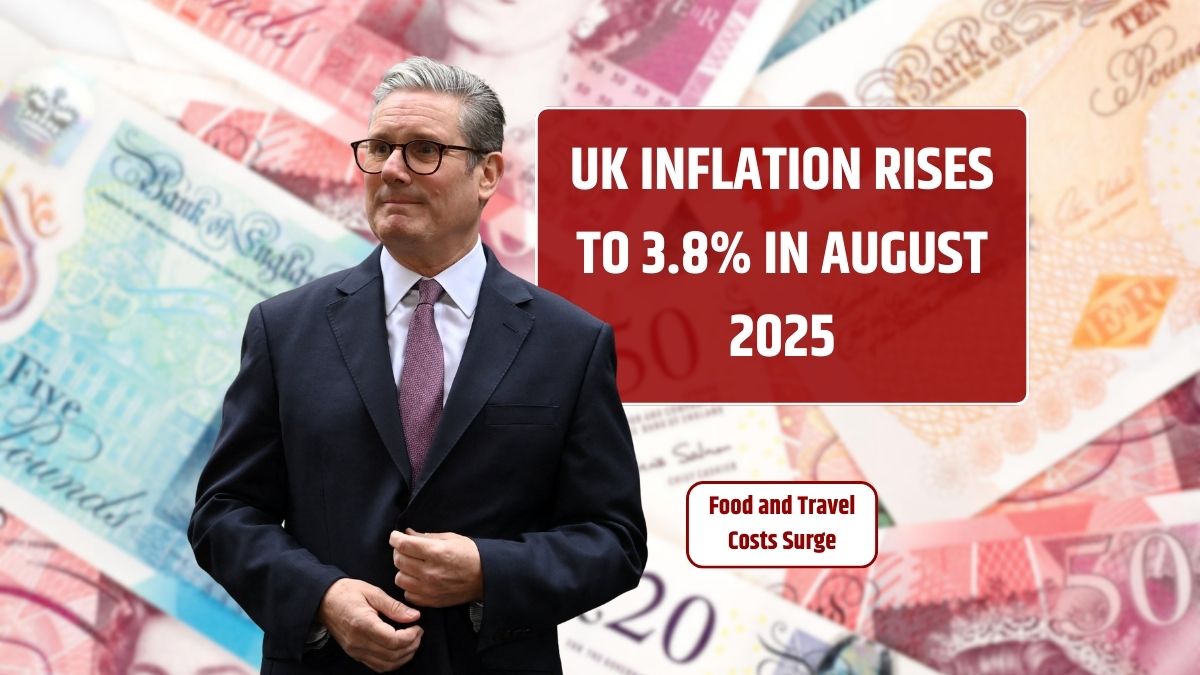UK inflation has edged higher again, reaching 3.8% in August 2025, driven by a sharp rise in food and travel prices. The figure surpassed expectations and raised fresh doubts about whether the Bank of England will lower interest rates again this year.
For the tenth month in a row, inflation has remained above the Bank’s 2% target. While the rate is far below last year’s peaks, it still signals persistent cost-of-living pressure for households.
Table of Contents
Jump
August’s rise from 3.6% in July surprised analysts, who forecasted a 3.7% reading. The unexpected increase is causing financial markets to rethink their expectations for further interest rate cuts in 2025.
Now, a rate cut is not expected until spring 2026, with the chances of one before the end of this year looking slim.
Airfare
One of the biggest contributors to the rise in inflation was a 30% month-on-month jump in airfare. The Office for National Statistics said this was mainly due to the earlier timing of the summer school holidays in 2025. While seasonal, it still had a noticeable impact on inflation.
Petrol prices also nudged inflation higher, adding around 0.1 percentage points. This time last year, fuel prices were falling, making this year’s modest increase more noticeable in the data.
Food
Food and non-alcoholic drink prices climbed 4.9% over the past year—an increase from 4.5% in June. The worst-hit items included beef, coffee, orange juice, and chocolate.
Much of this rise is being blamed on extreme weather in southern Europe. Droughts in Spain, Italy, and Portugal have reduced the availability of fresh fruit and vegetables imported into the UK, just when prices would normally dip for summer.
This food price surge is a big concern—not just for households, but also for the government’s upcoming talks with public sector unions.
Wages
With food costs rising, unions are pushing for bigger pay increases. Ministers want to keep most public sector pay deals below 4%, but rising living costs may make that a tough sell.
Sharon Graham, head of Unite union, said that working families are being pushed to the brink and that the government must raise wages to protect household budgets.
Rail
There’s also more bad news for commuters. Based on August’s inflation data, regulated rail fares could rise by 5.8% next year. These fare increases are typically tied to the retail prices index (RPI), which came in at 4.8%—plus one percentage point.
So, anyone who relies on the train for daily travel could see a sharp hike in ticket prices by 2026.
Rates
Earlier this month, the Bank of England lowered interest rates to 4%, hoping inflation would fall in the second half of the year. But the latest inflation data has thrown that plan into question.
The Bank’s monetary policy committee is divided—some members still support further cuts, while others want to hold steady until inflation shows a more reliable downward trend.
The National Institute of Economic and Social Research (Niesr) still thinks a cut is possible in November. They point to weakening job numbers, including a rise in unemployment and fewer job vacancies, as signs the economy is cooling.
Niesr economist Monica George Michail said many current inflation drivers are likely one-offs, like summer airfare spikes and food-related supply shocks. Still, ongoing wage pressure and food price volatility could keep the Bank cautious for now.
Government
Chancellor Rachel Reeves acknowledged the cost-of-living squeeze and said the government is taking steps to help struggling families. These include:
- Raising the minimum wage
- Extending the £3 bus fare cap
- Expanding free school meals to over 500,000 more children
- Rolling out free breakfast clubs in all schools
She said that while inflation is now far below the double-digit levels seen under the previous government, more needs to be done.
Shadow Chancellor Mel Stride blamed rising employer national insurance contributions for forcing businesses to raise prices, worsening the inflation problem.
Energy
And there’s another cost on the horizon. Cornwall Insight, an energy consultancy, expects the UK energy price cap to rise by £17—or about 1%—in October. That’s more pressure on household fuel bills just ahead of winter.
While inflation is expected to ease in the coming months, this latest increase shows the path back to the Bank’s 2% target won’t be smooth. Food, fuel, and travel costs continue to pose challenges—not just for families, but for interest rate decisions, wage negotiations, and broader economic stability.


